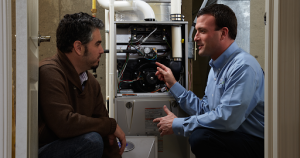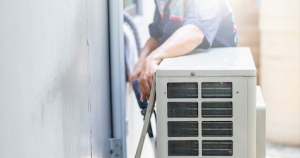Many homeowners have discovered that if anything can go wrong with a house, it will. Sometimes, the issues are annoying but can go ignored—a squeaky door, cabinets that don’t quite close right. Other times, they may require immediate attention, such as a non-functioning furnace or air conditioner during weather extremes. Concerns about HVAC repair costs are frequent for budget-conscious homeowners seeking to maintain their home’s comfort and functionality. This blog post addresses key factors influencing these expenses to help you make informed decisions about HVAC repairs.
Age isn’t Just a Number for Your Furnace and A/C.
Your system’s age is a critical detail that can significantly influence the cost and frequency of repairs needed and the HVAC repair costs. It’s a rough rule of thumb, but the industry standard is that if a system is ten years old or younger, we should investigate what’s causing the problem and fix it with a reliable repair.
Less Than 5 Years Old: For systems less than five years old that are young and robust, still fresh out of the box, and in the peak of their prime years, most issues are often covered by the manufacturer’s warranty.
5-10 Years Old: As wear and tear set in after a handful of heating and cooling seasons, minor issues may crop up with five to 10-year-old systems. However, systems in this age range are expected to have several years of operational life remaining. Repairs are generally more cost-effective than a total replacement.
10-15 Years Old: Not every system should have its plug pulled if an issue arises and it’s over 10 or 11 years old. An older system that’s 10 to 15 years old may still be a good candidate for repairs, especially if it’s been well-maintained.
15+ Years Old: In their “golden years,” systems older than 15 years needing more than a few hundred dollars in repairs typically require replacement. As expected, with older equipment, they’re more vulnerable to significant breakdowns and more substantial malfunctions. Finding replacement parts for older equipment can be next to impossible and expensive. And 15- to 20-year-old equipment simply can’t compete with today’s state-of-the-art, energy-efficient technology.

HVAC repair costs can be reduced by regular maintenance
Minding Your Maintenance is Critical.
Regularly scheduled maintenance is a must for homeowners seeking to extend the lifespan of their HVAC systems. Some manufacturers require homeowners to maintain a service contract to maintain system warranties. Even if yours does not, preventative maintenance is a wise investment that can catch more minor, less expensive issues and make the need for significant repairs far less likely. A few benefits of maintenance include the following:
Improved Energy Efficiency: Regular maintenance can improve the efficiency of HVAC systems. Efficient systems use less energy to maintain comfortable indoor temperatures, lowering utility bills.
Extended Equipment Lifespan: Regularly maintaining HVAC units can extend their lifespans by several years compared to neglected systems.
Improved Indoor Air Quality: According to the Environmental Protection Agency, indoor air can be 2 to 5 times more polluted than outdoor air. Regular maintenance of HVAC systems (including cleaning and replacing air filters) ensures better indoor air quality, which is crucial for occupant health and comfort.
All Parts are not Equal. What Needs Fixed?
HVAC repair costs can vary dramatically depending on the specific parts affected and the severity of the damage.
Refrigerant: Refrigerant has always been one of the pricier elements of HVAC. Despite its chilly name, refrigerant is a gas that helps transfer heat out of your home, so air conditioning can keep you cool. The Environmental Protection Agency started phasing out R-22 refrigerant (a.k.a. Freon) in 2010. A total ban on production and importation of it went into effect in 2020.
R-410A, R22’s replacement, is also being phased out in favor of newer, more environmentally friendly refrigerants. While both R-22 and 410A refrigerants are still available for existing equipment repairs, those repairs will be more expensive. The bottom line is that if your current system is getting old and contains R-22 or R-410A, costs will likely continue to rise over the next few years, and it may be time to consider getting a new system.
Evaporator Coil: Your air conditioner’s evaporator coil is crucial in absorbing and trapping heat from indoor air and facilitating the cooling process. It usually costs as much to repair an old evaporator coil as it does to replace one.
Condenser Coil: The condenser coil located inside your system’s exterior unit is an essential HVAC component that releases the heat absorbed from indoor air to the outdoors. Repair and replacement costs are similar to those of evaporator coils. However, complete system replacement is likely the most cost-effective option if the condenser needs replacing.
Compressor: The compressor’s primary function is to circulate refrigerant throughout the HVAC system. Technicians may be able to repair a broken-down compressor, but in most cases, you’ll likely need to replace it since it can be a costly repair.
Circuit Board: If there’s a problem with electrical components such as a fuse or capacitor, the parts to repair your system’s circuit board are usually less than a couple hundred dollars. However, with a global shortage of semiconductor chips used in many consumer products, replacing a system’s circuit board could cost $500 or more.
Thermostat: Replacing an old or faulty thermostat can be a DIY project for some handy homeowners. However, installation and setup by a professionally trained technician is relatively inexpensive and ensures all electrical connections are safe and secure.

Professional servicing and tune up can help reduce HVAC repair costs.
Honest, Reliable Repairs and Precision Comfort
We know that suddenly needing heating or cooling service and the associated HVAC repair costs can be stressful for homeowners. Our comfort specialists can help make the process easier, finding the exact problems with your system, explaining our recommendations plainly, and guiding you through the decisions ahead. We pride ourselves on reasonable prices and the expertise to identify specific issues instead of trying various fixes, hoping one works.
We have helped thousands of families like yours across Northern Indianapolis, Carmel, Zionsville, Westfield, Noblesville, Fishers, Cicero, and more save money on their comfort system repairs. Reach out to Precision’s comfort specialists today for a free second opinion and rapid-response service that can quickly get your home safe and comfortable again.
